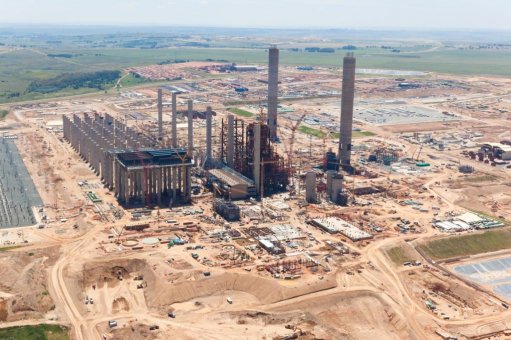
Kusile power station, in Mpumalanga
Nonprofit organisation Greenpeace has expressed its disappointment at China choosing to support “dirty, dead-end coal” in South Africa, especially since China has an emerging and strengthening leadership on climate change.
This comment follows after State-owned power utility Eskom on Tuesday signed a R33-billion, or $2.5-billion, loan agreement with the China Development Bank to form part of funding for Eskom’s build programme, with emphasis on the Kusile power station.
Eskom can draw upon the facility for five years.
“Kusile will be a mammoth coal-fired power station if it is completed and will use up massive amounts of scarce water resources. Investment in coal will continue to create pollution that will damage people’s health and drive us closer to unstoppable climate change,” said Greenpeace Africa climate and energy campaign senior manager Melita Steele.
Greenpeace suggests that the last two units of Kusile not be completed and that the money should rather be redirected to renewable energy.
Eskom CE Phakamani Hadebe on Tuesday said the China Development Bank remains a valued partner and a key contributor to the progress achieved by Eskom in executing the current build programme.
“The successful conclusion of this facility brings Eskom in line with the company’s commitment to imminently secure 62% of the 2018/19 financial year’s funding requirement.
“Both local and international financial markets have demonstrated an improved appetite for Eskom’s credit and we are confident that we will fully execute the required funding for the year. Our liquidity levels are continuing to improve and our financial sustainability is on the mend,” added Eskom acting CFO Calib Cassim.
Meanwhile, the Democratic Alliance (DA) said the loan would not ensure long-term financial stability for Eskom and that it was merely a “small band aid” for the lossmaking utility.
The DA still calls on government to privatise the energy sector, as it is expected to bring liquidity, expertise and competition into the space.
The DA is in the process of introducing a Private Members Bill which is focussed on breaking up Eskom into two separate entities: a transmission public entity, which will manage the grid and transmission lines, and a generating entity which will be privatised.
This will not only improve performance and efficiency in the energy sector but will also contribute to job creation for the 9.5-million unemployed South Africans, the DA said.
Moreover, the DA will write to Eskom chairperson Jabu Mabuza to request that the utility make the terms of this loan from China Development Bank public in the interest of openness and transparency.
This letter will request the repayment terms of the loan, what the agreed interest rate is and what guarantees have been provided to secure the loan.